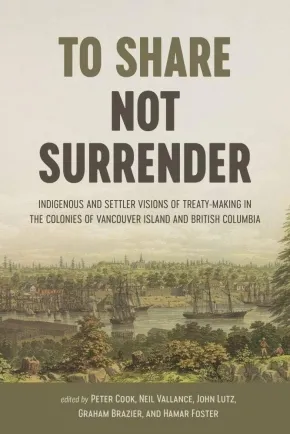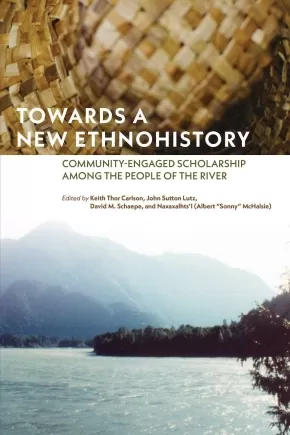John Sutton Lutz
John Lutz is professor of history at the University of Victoria and author of Makúk: A New History of Indigenous-White Relations.
Books (2)
Synopsis:
Too often, history and knowledge of Indigenous-settler conflict over land take the form of confidential reports prepared for court challenges. To Share, Not Surrender offers an entirely new approach, opening scholarship to the public and augmenting it with First Nations community expertise.
The collection appraises the historical and present-day relevance of treaty-making in the colonies of Vancouver Island and British Columbia. The authors take us back to when James Douglas and his family relocated to Fort Victoria on Vancouver Island in 1849, critically tracing the transition from treaty-making in the colony of Vancouver Island to reserve formation in the colony of British Columbia. Informed by cel’aṉ’en – “our culture, the way of our people” – this multivocal work explicitly addresses the tensions between academic research, Indigenous knowledge, and local experience. The collection includes essays, translations/interpretations of the treaties into the SENĆOŦEN and Lekwungen languages, and contributions by participants of the Songhees, Huu-ay-aht, and WSANEC peoples.
The chapters demonstrate that the continuing inability to arrive at equitable land-sharing arrangements stem from a fundamental absence of will with respect to accommodating First Nations world views. To Share, Not Surrender is an attempt to understand why, and thus to advance the urgent task of reconciliation in Canada.
The multiple perspectives presented in this important work will find equally diverse audiences: Canadian historians, scholars and students of Indigenous studies, ethno-historians, legal historians, lawyers practising in the areas of Aboriginal law, and researchers preparing historical reports on First Nation land claims.
Reviews
"The past is with us and history matters. Read To Share Not Surrender as a great example of how there can be different interpretations of the past." — Robin Fisher, The British Columbia Review
"After James Douglas negotiated treaties on Vancouver Island, he never made another in BC. Why not? Some of the foremost experts in the field work here to answer this question, analyzing Douglas’s policies and their lasting impact on BC First Nations’ continuing battle with rights and title." — Daniel Boxberger, professor emeritus, anthropology, Western Washington University
"The connection that To Share, Not Surrender makes between the events of the 1850s and 1860s and the modern-day treaty process in British Columbia is extremely valuable. It helps the reader develop a better understanding, not only of colonial history, but also of the relevance of Indigenous law to territorial claims today." — Kent McNeil, author of Flawed Precedent: The St. Catherine’s Case and Aboriginal Title
Educator Information
Contributors: Keith Thor Carlson, Robert Clifford, Emchayiik Robert Dennis Sr., STOLCEL John Elliott Sr., Elmer George, Stephen Hume, Maxine Hayman Matilpi, Kevin Neary, Adele Perry, Sarah Pike, Chief Ron Sam, and Laura Spitz
Additional Information
330 pages | 6.00" x 9.00" | Paperback
Synopsis:
Towards a New Ethnohistory engages respectfully in cross-cultural dialogue and interdisciplinary methods to co-create with Indigenous people a new, decolonized ethnohistory. This new ethnohistory reflects Indigenous ways of knowing and is a direct response to critiques of scholars who have for too long foisted their own research agendas onto Indigenous communities. Community-engaged scholarship invites members of the Indigenous community themselves to identify the research questions, host the researchers while they conduct the research, and participate meaningfully in the analysis of the researchers’ findings.
The historical research topics chosen by the Stó:lō community leaders and knowledge keepers for the contributors to this collection range from the intimate and personal, to the broad and collective. But what principally distinguishes the analyses is the way settler colonialism is positioned as something that unfolds in sometimes unexpected ways within Stó:lō history, as opposed to the other way around.
This collection presents the best work to come out of the world’s only graduate-level humanities-based ethnohistory fieldschool. The blending of methodologies and approaches from the humanities and social sciences is a model of twenty-first century interdisciplinarity.
Reviews
“At a time when Indigenous sovereignty has come to the fore, this volume sets the ‘gold standard’ for ethical scholarship and provides a roadmap and manifesto for sensible and sensitive decolonization.”– Chris Friday, Professor of History, Western Washington University
“The strength of the collection is its appreciation for and attention to interpreting history with reference to Stó:lō interpretative frames.” – Tyler McCreary, BC Booklook
“In a time when many scholars are looking to decolonize their approaches to research—especially when working with Indigenous communities—this book stands as a clear exemplar of community-engaged research and demonstrates how it can be done well.”– Jennifer Megan Markides, University of Calgary, Qualitative Research in Education
“Exemplifies a new, transdisciplinary approach to ethnohistory, in which the researcher recognizes not only the legacy of settler colonialism in Canada, but also the subjectivity and relativity of their own views and western knowledge as a whole. This new ethnohistory aims to work with the community at all levels of research and form and sustain relationships that last long after fieldwork is conducted. Its hope is to produce scholarship that is cutting edge, complex, accessible and relevant to members of the community.”– Daniel Sims, NICHE
“Settler scholars concerned with disciplinary crises need look no further than this excellent anthology for models of respectful intercommunity engagement, radical methodology and pedagogy, and a paradigm for solidarity work that chooses to develop respectful relationships over moribund agonizing.”– Madeleine Reddon, Canadian Literature
Educator Information
Table of Contents
Introduction
Ch. 1—Kinship Obligations to the Environment
Ch. 2—Relationships
Ch. 3—Crossing Paths
Ch. 4—Stó:lō Ancestral Names, Identity and the Politics of History
Ch. 5—Disturbing the Dead
Ch. 6—Food as a Window into Stó:lō Tradition and Stó:lō-Newcomer Relation
Ch. 7—’Bringing Home all That Has Left’
Ch. 8—Totem Tigers and Salish Sluggers
Ch. 9—’I Was Born a Logger’
Ch. 10—’They Are Always Looking for the Bad Stuff’
Ch. 11—Next Steps in Indigenous Community-Engaged Research
Additional Information
304 pages | 6.00" x 9.00"








